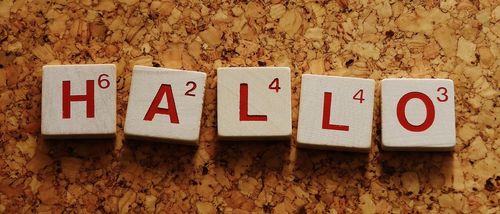Gracious Responses: The Art of Saying You're Welcome in Chinese
Discover 15 unique ways to say you're welcome in Chinese and learn how to use them appropriately in different social situations

Gracious Responses: The Art of Saying 'You're Welcome' in Chinese
The art of conversation in any language is not just about exchanging information but also about showing appreciation and respect. In Chinese culture, the act of saying thank you is followed by a polite response of you're welcome. In this article, we delve into the rich world of Chinese expressions used to acknowledge gratitude. Discover 15 unique ways to say you're welcome in Chinese and learn how to use them appropriately in different social situations. Whether you're a language learner, a traveler, or simply interested in expanding your knowledge, this article is an essential guide to help you express gratitude in the Chinese language
1. 不用谢 (bù yòng xiè): This is a common and polite way to say you're welcome.
Example:
A: 谢谢你借我钱。 (xiè xiè nǐ jiè wǒ qián) - Thank you for lending me money.
B: 不用谢。 (bù yòng xiè) - You're welcome.
2. 没关系 (méi guān xi): This translates to it doesn't matter.
Example:
A: 谢谢你把我的东西给我。 (xiè xiè nǐ bǎ wǒ de dōng xi gěi wǒ) - Thank you for giving me back my things.
B: 没关系。 (méi guān xi) - It doesn't matter.
3. 别客气 (bié kè qì): This is a casual way to say you're welcome.
Example:
A: 谢谢你帮我开门。 (xiè xiè nǐ bāng wǒ kāi mén) - Thank you for opening the door for me.
B: 别客气。 (bié kè qì) - You're welcome.
4. 没事 (méi shì): This is another casual way to say you're welcome.
Example:
A: 谢谢你给我打电话。 (xiè xiè nǐ gěi wǒ dǎ diàn huà) - Thank you for calling me.
B: 没事。 (méi shì) - You're welcome.
5. 没什么 (méi shén me): This is another casual response to thank you.
Example:
A: 谢谢你把门给我开了。 (xiè xiè nǐ bǎ mén gěi wǒ kāi le) - Thank you for opening the door for me.
B: 没什么。 (méi shén me) - You're welcome.
6. 不要紧 (bù yào jǐn): This is a way to say it's no big deal.
Example:
A: 谢谢你帮我。 (xiè xiè nǐ bāng wǒ) - Thank you for helping me.
B: 不要紧。 (bù yào jǐn) - It's no big deal.
7. 随便 (suí biàn): This is a casual way to say you're welcome.
Example:
A: 谢谢你帮我买票。 (xiè xiè nǐ bāng wǒ mǎi piào) - Thank you for buying tickets for me.
B: 随便。 (suí biàn) - You're welcome.
8. 没什么好谢的 (méi shén me hǎo xiè de): This is a polite way to say there's nothing to thank for.
Example:
A: 谢谢你给我一些建议。 (xiè xiè nǐ gěi wǒ yī xiē jiàn yì) - Thank you for giving me some advice.
B: 没什么好谢的。 (méi shén me hǎo xiè de) - There's nothing to thank for.
9. 不用谢我 (bù yòng xiè wǒ): This is a polite way to say don't thank me.
Example:
A: 谢谢你帮我找到了我的钱包。 (xiè xiè nǐ bāng wǒ zhǎo dào le wǒ de qián bāo) - Thank you for finding my wallet.
B: 不用谢我。 (bù yòng xiè wǒ) - Don't thank me.
10. 不客气 (bù kè qì): This is a polite way to say you're welcome.
Example:
A: 谢谢你给我一个提示。 (xiè xiè nǐ gěi wǒ yī gè tí shì) - Thank you for giving me a hint.
B: 不客气。 (bù kè qì) - You're welcome.
11. 没事啦 (méi shì la): This is a casual way to say it's no problem.
Example:
A: 谢谢你给我送邮件。 (xiè xiè nǐ gěi wǒ sòng yóu jiàn) - Thank you for sending me the mail.
B: 没事啦。 (méi shì la) - It's no problem.
12. 小事一桩 (xiǎo shì yī zhuāng): This is a casual way to say it's just a small thing.
Example:
A: 谢谢你给我拿了一杯水。 (xiè xiè nǐ gěi wǒ ná le yī bēi shuǐ) - Thank you for getting me a glass of water.
B: 小事一桩。 (xiǎo shì yī zhuāng) - It's just a small thing.
13. 别客气 (bié kè qì): This is a casual way to say don't be polite.
Example:
A: 谢谢你给我搭车。 (xiè xiè nǐ gěi wǒ dā chē) - Thank you for giving me a ride.
B: 别客气。 (bié kè qì) - Don't be polite.
14. 没关系 (méi guān xì): This is a casual way to say it doesn't matter.
Example:
A: 谢谢你帮我买了一个雨伞。 (xiè xiè nǐ bāng wǒ mǎi le yī gè yǔ sǎn) - Thank you for buying me an umbrella.
B: 没关系。 (méi guān xì) - It doesn't matter.
15. 这不是什么大事 (zhè bú shì shén me dà shì): This is a casual way to say it's not a big deal.
Example:
A: 谢谢你帮我找了一个地图。 (xiè xiè nǐ bāng wǒ zhǎo le yī gè dì tú) - Thank you for finding me a map.
B: 这不是什么大事。 (zhè bú shì shén me dà shì) - It's not a big deal.
In conclusion, there are many ways to say you're welcome in Chinese, each with a different level of formality and casualness. It's important to choose the right expression based on the situation and the relationship between the speaker and the listener. Whether it's a casual 随便 or a polite 不用谢我, understanding these different expressions will help you communicate more effectively and show respect in Chinese culture.








